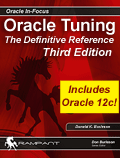Oracle Database Files Concepts
The final components of the Oracle architecture are the
physical files where our information resided on disk. Oracle has several types
for data files, each for a different purpose:
* Database datafiles
* Control files
* Online redo logs
* Parameter files
* Other database related files
Let?s look at each of these physical files in a bit more
detail.
Database datafiles
Database datafiles are physical files stored on disk.
These files are used to store data on disk. Database datafiles are only written
to by the DBWR processes that we introduced you to earlier (there is an
exception or two to this statement, but for now, assume that this point this
true).
These database datafiles are associated with Oracle
?tablespaces?, which are ?logical? containers for tables and indexes.
Control files
The Control File of the database is a binary file that
contains a great deal of database information. The control file contains the
database name, data about the database log files. Oracle cannot function without
valid control files.
Because the control file is so important, Oracle allows
you to maintain duplicate copies of the control file. When you have more than
one control file, then you are said to be multiplexing your control files. It is
a good practice to put these multiple copies on different disks to protect the
control file. Later in this book, we will demonstrate how to do this.
Online redo logs concepts
Think of the online redo logs like a tape recorder that
records every change in the Oracle database. As changes occur, they are
regularly recorded in the online redo logs, just like you might record a movie
on your VCR.
In the event that a disk crashes, you may have to
replace the disk and restore the disk data from a backup tape. If this backup
tape was several days ago, you have lost a lot of data.
Fortunately, Oracle can ?replay? the saved transactions
in the online redo logs, and re-apply lost transactions back into the database.
Many times, this means that Oracle can recover from a crash without the DBA
having to do anything other than just telling the database to startup. We will
cover the topic of online redo log files and how they relate to database
recovery in later chapters of this book.
At a minimum, Oracle requires that you have two online
redo logs assigned to the database. Oracle will write redo to the first log, and
when the first log is full, Oracle will switch to the second log and write the
same redo. Each of these individual online redo logs is known as an online redo
log group.
The reason we call them groups is that there can be
mirrored copies of the online redo log files in each group. Like control files,
it?s a good idea to have multiplexed copies of the Online redo logs. Oracle
allows you to define multiple copies of these files. Each copy is called a
member. Each redo log group can have one or more members. We will discuss the
online redo log files in more detail in later chapters.
Oracle Parameter file Concepts
The parameter file (sometimes called init.ora) contains
configuration information for the database to use at startup time. The parameter
file you configure how much RAM the database is going to use, where to find the
control files, where to write trace files, and a whole host of other
information. In most cases the database will not start without a parameter file.
Oracle allows you to have a manual parameter file (called a PFILE) or a
server-side parameter file (called a SPFILE).
Other Database Related Files
When working with the Oracle database you will be
introduced to a number of different kinds of files. The following table is a
list of the most common files and their general purpose. As we proceed through
the chapters of this book, you will be introduced to many of these files in more
detail.
* Oracle Trace Files - Created by Oracle in a number of
different situations. These can be created as a result of a database crash, a
session failure, an unexpected but non-fatal database failure, or based on
specific user operational commands.
* Alert log - This is the general log file for each
Oracle database.
Networking configuration files - These files are used to
configure the different network components of the Oracle database. These include
files such as tnsnames.ora and listener.ora.
* Oracle Database Software Binaries - The Oracle
Database software includes the basic programs that allow the database to
function.
This is an excerpt from the bestselling "Easy
Oracle Jumpstart" by Robert Freeman and Steve Karam (Oracle ACE and Oracle
Certified Master). It?s only $19.95 when you buy it directly from the
publisher
here.
 |
If you like Oracle tuning, you may enjoy the new book "Oracle
Tuning: The Definitive Reference", over 900 pages of BC's favorite tuning
tips & scripts.
You can buy it direct from the publisher for 30%-off and get instant access to
the code depot of Oracle tuning scripts. |
